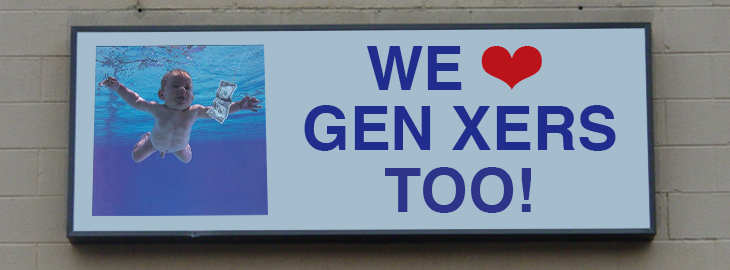
The Original Workplace Disruptors Would Like Some Love, Too
Posted On February 14, 2016
I’ve written a lot on the blog lately about how many workplaces are shifting – some, perhaps too quickly – to attract millennials. A recent Forbes article, however, argues that employers would be wise to not forget about Generation X.
Writer Natalie Burg, a former downtown development professional, cites executives and human resources professionals who note that Gen-Xers are valuable in managerial roles because they can relate to both Baby Boomers and millennials, and alienating them through fast-tracking company policies toward millennials can result in a leadership void.
But how to ensure, as you seek to attract the most talented millennials, that your workplace is still attractive to Gen-Xers as well? Credence Clearwater Revival on-hold music in the telephone system? A Back to the Future-themed Christmas party? Retaining a few stray cubicles as an homage, like the remnant of the Forbes Field outfield wall still standing in Pittsburgh 46 years after the park’s demolition?
Burg has some more pragmatic proposals:
- Make sure your “employment brand” is inclusive and isn’t tailored specifically to millennials. A too narrowly drawn focus – images of 20-somethings in hoodies riding scooters around the workplace, for instance – may tend to leave older employees (or potential employees) feeling like there is no place for them in the firm’s future. This extends to the workplace itself, which can leave Gen-Xers feeling like fish out of water – and employees who aren’t part of the plan – if changes to attract millennials are made too rapidly.
- Address their needs. Most of them have families with which they want to spend time, are likely saving for their children’s college educations and are at least starting to think about potentially having to care for aging parents in the not-too-distant future. They’re looking for tools with which to meet these goals, such as long-term care insurance, college savings plans and flexible work hours.
- Professional development is important. Gen-Xers don’t like to be told what to do any more than millennials. Give them the tools with which to improve themselves, personalize those tools so they don’t feel like a number, and increased performance should follow.
- Be generous with feedback. Gen-Xers often keep their heads down and bear down on the work. If you don’t let them know where they stand, they may never know. And if you don’t ask how they’re doing, it may be difficult to tell when they’re starting to burn out – or if all those millennial-geared changes you’ve made at the office have led them to start shipping out resumes by the truckload.